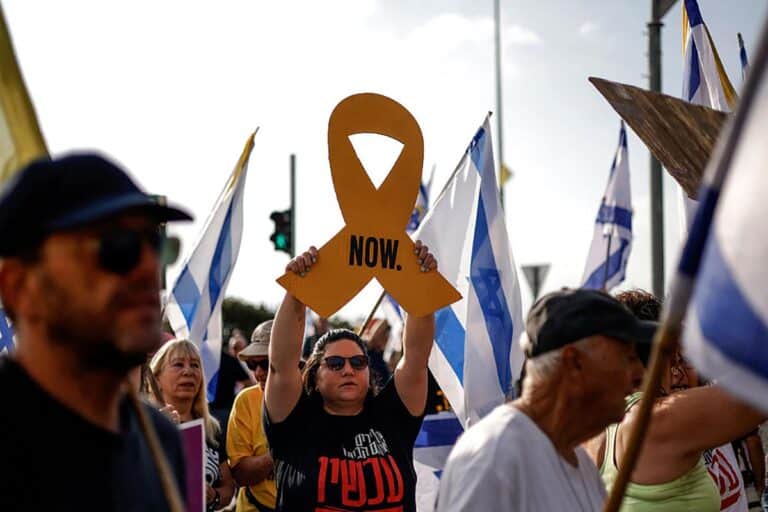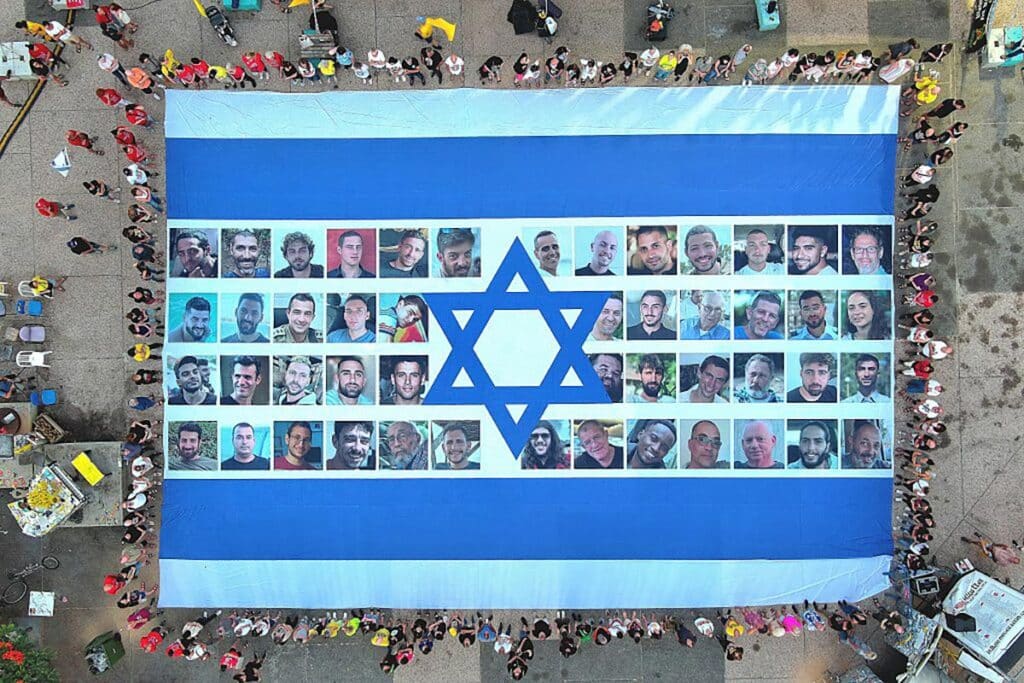
Hundreds of thousands of Israelis took to the streets on Sunday to demand a comprehensive ceasefire and hostage release deal, as the IDF prepared to expand its operations in Gaza.
About 18,000 freelancers and businesses went on strike for the day in solidarity with the families of hostages, and to allow workers to go to protests. Many other businesses allowed employees to take the day off without any penalties to take part in the protests.
Demonstrations took place in over 300 locations around the country, with the largest occurring at Hostage Square in Tel Aviv. Protest organizers said that over 300,000 people arrived at Hostage Square for the demonstration and over 2.5 million took part in protests across the country, although police didn’t publish an official estimate.
Almost 500,000 People Gathered in Hostages Square and Surrounding Streets to Make It Clear – The Entire People of Israel Want the Release of All the Hostages and End the War.
— Bring Them Home Now (@bringhomenow) August 17, 2025
Credit: Yair Palti pic.twitter.com/NkTidIl96d
Throughout the day, protesters blocked major highways in Israel for hours on end. During the protests, the Iran-backed Houthis in Yemen fired a missile toward Israel, setting off rocket sirens in Tel Aviv and forcing thousands to seek cover.
The demonstrations were meant to show that the country hasn’t forgotten about the hostages and to protest against plans to expand military operations in Gaza City. Many Israelis also showed up to express solidarity with the hostage families.
The Hostage and Missing Families Forum announced after the protests that it would hold another day of nationwide demonstrations on Sunday Aug. 23 as well.
Protests come after government decision to expand Gaza operation
The protests come as Israel prepares a new military operation to take over Gaza City, including some areas that the IDF hasn’t entered yet over concerns that it would put the hostages’ lives at further risk.
The government issued the decision to take over Gaza City two weeks ago, but the preparations for the actual operation are expected to take another six weeks at least.
Simultaneously, Israel has been trying to push Hamas to agree to a comprehensive deal under which the terrorist group would release all 50 hostages still being held in Gaza at once. While up until now, the Israeli government has refused to consider such an agreement, in recent weeks, it shifted its position and is now solely pursuing this kind of deal.
In its decision to launch a new operation in Gaza City, the government also set, for the first time, five clear conditions under which Israel is willing to end the war:
- Disarming Hamas
- Returning all the hostages
- The demilitarization of the Gaza Strip
- Israeli security control of Gaza
- The establishment of an alternative civil administration that is neither Hamas nor the Palestinian Authority
The combination of the two decisions was framed by many as intentional, meant to signal to Hamas that the Gaza City operation could be halted if it agreed to a ceasefire on Israel’s terms. However, if Hamas continues to refuse, it was made clear that the Gaza City operation would go through, with many Israeli officials arguing that further military pressure was necessary for Hamas to agree to Israel’s demands.
The families of many of the hostages have argued, however, that military pressure — especially an operation that enters areas where some of the hostages are believed to be held — might further endanger them.
Hamas took 251 people hostage on Oct. 7, 2023, and four Israelis were still in captivity after being taken hostage about a decade ago.
Over the past two years, 140 hostages have been released in agreements with either Israel or outside nations, and eight have been rescued alive in military missions. The bodies of 57 hostages have been retrieved amid military operations in Gaza, including four shot mistakenly by Israeli forces on the ground, four who died in airstrikes, and seven who their captors killed after Israeli forces neared their positions.
A day after the protests, Hamas expresses willingness to accept a phased ceasefire
Just a day after the protests, Hamas announced that it had accepted a new ceasefire proposal from the mediators.
The new proposal would reportedly bring about a phased deal, starting with a 60-day ceasefire and the release of 10 living hostages and the bodies of 18 murdered hostages. In return, Israel would release around 140 Palestinians serving life sentences and 60 prisoners serving over 15-year sentences. For each body of a hostage, Israel would need to release 10 bodies of terrorists. These details haven’t been officially confirmed by either side.
Prime Minister Benjamin Netanyahu has reportedly expressed openness to accepting a phased deal like this, despite earlier statements that he would only consider a comprehensive agreement to end the war on Israel’s terms. Israel’s national broadcaster, KAN, reported on Monday that Netanyahu would, however, accept a phased deal “under certain conditions,” although the specific conditions were not clear.
Israelis are divided on whether protests do more harm than good
While the protests drew large numbers, Israelis were divided on whether the demonstrations would bring the release of the hostages closer or possibly encourage Hamas to harden its position and make a deal unattainable.

Zvika Mor, whose son Eitan is being held hostage in Gaza, called on the protest leaders to stop the strike, insisting that these demonstrations would only cause harm to the hostages and the entire country.
“Do you want the State of Israel to surrender to Hamas? Please, go among the 500 bereaved families whose sons fell in Gaza and ask for permission. What, will their blood be shed for nothing? Go among the thousands of wounded and ask them if their injuries were in vain. All the hands, legs, ears, and eyes they left in Gaza, will it all be for nothing? Why surrender? What is this thing called surrendering? We must not surrender to the enemy. If we do not put pressure on him, we will never get everyone back. If you really want the kidnapped people at home, what you need to do is press outwards, not inwards.”
Netanyahu condemned the protests as well, saying “Those who call today for ending the war without defeating Hamas are not only hardening Hamas’s position and distancing the release of our hostages, they are also ensuring that the atrocities of October 7 will repeat themselves again and again, and that our sons and daughters will have to fight again and again in an endless war.”
U.S. President Donald Trump didn’t address the protests directly, but just a day later posted on Truth Social that “We will only see the return of the remaining hostages when Hamas is confronted and destroyed.”
“The sooner this takes place, the better the chances of success will be. Remember, I was the one who negotiated and got hundreds of hostages freed and released into Israel (and America!). I was the one who ended 6 wars, in just 6 months. I was the one who OBLITERATED Iran’s Nuclear facilities. Play to WIN, or don’t play at all!” Trump wrote.
Liran Berman, the brother of hostages Gali and Ziv Berman, rejected the claims that the protests would push Hamas to harden its positions, saying, “Hamas is hardening its positions with or without demonstrations.”
“In the end, we need to take advantage of the opportunities. I’m addressing my prime minister, not Hamas,” Berman added.
Arbel Yehud, an Israeli hostage released in a ceasefire in January, warned that “Military pressure doesn’t bring hostages home — it kills them.”
“The only way is a single, comprehensive deal without games. We must stop routine life again and again until everyone is returned,” Yehud continued.
Eli Sharabi, who was released in the ceasefire in February, stressed that the protests are important because, for the hostages, “seeing the demonstration is worth ten meals.”
“Just the knowledge that someone is fighting for me out there gave us tremendous power. It filled us with incredible optimism,” Sharabi added.
